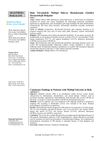 4 citations,
May 2021 in “Biomedicines”
4 citations,
May 2021 in “Biomedicines” Targeting the protein Caveolin-1 might help treat a type of scarring hair loss called Frontal Fibrosing Alopecia.
 June 2022 in “Al- Anbar Medical Journal”
June 2022 in “Al- Anbar Medical Journal” COVID-19 can cause skin problems.
 1 citations,
March 2019 in “Konuralp tıp dergisi”
1 citations,
March 2019 in “Konuralp tıp dergisi” MS patients often have skin issues, so regular skin checks are important.
55 citations,
November 2010 in “Journal of Allergy and Clinical Immunology” The L412F variant of TLR3 is linked to skin infections, more viral infections, and autoimmune issues.
 2 citations,
February 2014 in “Hair therapy & transplantation”
2 citations,
February 2014 in “Hair therapy & transplantation” Alopecia Areata is an autoimmune condition causing hair loss, influenced by genetics, environment, and possibly improved by anti-MIF therapy, with many patients experiencing regrowth within a year.
 18 citations,
May 2013 in “Cutaneous and Ocular Toxicology”
18 citations,
May 2013 in “Cutaneous and Ocular Toxicology” The cancer drugs bortezomib and lenalidomide cause skin side effects in many patients.
 18 citations,
November 2021 in “Anais Brasileiros de Dermatologia”
18 citations,
November 2021 in “Anais Brasileiros de Dermatologia” COVID-19 can cause various skin issues, like rashes and lesions, which are more common in younger patients and can be linked to more severe complications.
 August 2024 in “International Journal of Molecular Sciences”
August 2024 in “International Journal of Molecular Sciences” Androgenetic alopecia involves immune cell disruptions, especially increased CD4+ T cells around hair follicles.
 7 citations,
July 2019 in “International archives of internal medicine”
7 citations,
July 2019 in “International archives of internal medicine” Common skin conditions can greatly affect a person's mental health and social life.
 4 citations,
April 2010 in “Expert review of dermatology”
4 citations,
April 2010 in “Expert review of dermatology” Restoring immune privilege in hair follicles could help treat certain types of hair loss.
 7 citations,
July 2019 in “Advances in preventive medicine”
7 citations,
July 2019 in “Advances in preventive medicine” Most diabetic patients have skin problems, which are more common with longer diabetes duration and poor blood sugar control.
 12 citations,
December 2017 in “Food and chemical toxicology”
12 citations,
December 2017 in “Food and chemical toxicology” Permanent hair dye mixtures can irritate and damage the skin.
 8 citations,
January 2022 in “Burns and trauma”
8 citations,
January 2022 in “Burns and trauma” Skin cell-derived vesicles can help heal skin injuries effectively.
 42 citations,
January 2021 in “Journal of Clinical Medicine”
42 citations,
January 2021 in “Journal of Clinical Medicine” Microneedle arrays with nanotechnology show promise for painless drug delivery through the skin but need more research on safety and effectiveness.
11 citations,
January 2018 in “IET Nanobiotechnology” The scaffolds significantly sped up wound healing in dogs and were safe.
 14 citations,
January 2017 in “Elsevier eBooks”
14 citations,
January 2017 in “Elsevier eBooks” CBG may help with various medical conditions but needs more human research to confirm safety and effectiveness.
 124 citations,
October 2019 in “Frontiers in Immunology”
124 citations,
October 2019 in “Frontiers in Immunology” Janus kinase inhibitors are promising treatments for autoimmune skin diseases like eczema and psoriasis.
 1 citations,
October 2023 in “Romanian Journal of Morphology and Embryology”
1 citations,
October 2023 in “Romanian Journal of Morphology and Embryology” COVID-19 can cause various skin issues, but long-term skin problems are rare.
 26 citations,
July 2021 in “Frontiers in Cell and Developmental Biology”
26 citations,
July 2021 in “Frontiers in Cell and Developmental Biology” The review suggests that a special cell-derived treatment shows promise for various skin conditions and hair growth but needs more research for confirmation.
 4 citations,
February 2022 in “Frontiers in molecular biosciences”
4 citations,
February 2022 in “Frontiers in molecular biosciences” Chronic stress in mice changes skin metabolism and gene expression, leading to hair loss.
 May 2024 in “Frontiers in Immunology”
May 2024 in “Frontiers in Immunology” Type-2 immunity may influence skin diseases and could be targeted for treatment.
 13 citations,
April 2019 in “Actas Dermo-Sifiliográficas”
13 citations,
April 2019 in “Actas Dermo-Sifiliográficas” Vitamin D is important for skin health, but more research is needed to understand its full effects and treatment potential.
9 citations,
August 2021 in “International journal of molecular sciences” PPARγ is essential for maintaining healthy skin, controlling inflammation, and ensuring proper skin barrier function.
 39 citations,
April 2011 in “Recent Patents on Drug Delivery & Formulation”
39 citations,
April 2011 in “Recent Patents on Drug Delivery & Formulation” Nanoemulsion-based drug delivery systems are versatile and have potential for treating various medical conditions and improving vaccines.
 15 citations,
June 2011 in “Journal of Ginseng Research”
15 citations,
June 2011 in “Journal of Ginseng Research” Korean Red Ginseng may improve skin condition and reduce allergy markers in atopic dermatitis patients.
 68 citations,
December 2014 in “Cell Biochemistry and Function”
68 citations,
December 2014 in “Cell Biochemistry and Function” Nuclear hormone receptors play a significant role in skin wound healing and could lead to better treatment methods.

A man with four autoimmune diseases suggests a new category for multiple autoimmune syndrome.
 68 citations,
September 2018 in “International Journal of Molecular Sciences”
68 citations,
September 2018 in “International Journal of Molecular Sciences” Air pollution (PM10) increases skin inflammation and aging by reducing collagen and may trigger a repair response in skin cells.
 1 citations,
August 2023 in “bioRxiv (Cold Spring Harbor Laboratory)”
1 citations,
August 2023 in “bioRxiv (Cold Spring Harbor Laboratory)” The research created a detailed map of skin cells, showing that certain cells in basal cell carcinoma may come from hair follicles and could help the cancer grow.
 466 citations,
August 2004 in “Journal of the American Academy of Dermatology”
466 citations,
August 2004 in “Journal of the American Academy of Dermatology” Rosacea is a skin condition with unclear causes, classified into four subtypes.


























